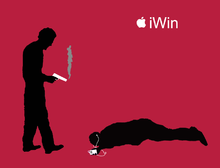Apple Watch
| Service Information | |
|---|---|
| Organization type | Watch/Security |
| Services | Protection of apple orchards from theft |
| Powers | Ability to make licensed citizen's arrest, record evidence |
| Salary | $30,000 per member per year |
| Core | Four core members plus optional two extra members |
Apple Watch refers to an organization that protects the growth and harvest of Apples. It was introduced by Apple Inc in 2014 to protect valuable apples from would-be thieves. The Apple Watch has faced criticism: opponents argue that the Apple Watch is both unnecessary and overpriced. Despite this, it is anticipated to be popular among farmers.
History[edit]
Historically apples are a status symbol due to their relative high price in relation to their minimal nutritional value. Critics point out that bananas offer more protein at a much lower price and that Apple farmers use the controversial "Walled Garden" system. This approach have made Apples unpopular in the enterprise environment, but very popular among young people and students, leading to the common gesture of giving a favorite teacher an apple.

On September 9, 2014 Mr. Cook (head of Apple cooking application department) announced the introduction of the Apple Watch, entering Apple Inc into the luxury fruit protection industry. This was seen by many as the ultimate extension of the role of the apple as a status symbol.
Features[edit]
The Watch utilizes the Apple Pay system allowing members of the watch to purchase goods using apples as currency. The Watch is capable of stopping "approximately 94% of potential fruit thefts" according to internal Apple Inc testing. The Apple Watch requires an Apple Phone, a recently announced device that has elicited comparisons to the popular Banana Phone.
Charging[edit]
The Apple Watch uses a new charging system that Apple has called in press releases "revolutionary." The charging method is similar to a citizens arrest or the powers granted to a private Security guard. Upon apprehension of a criminal the Apple Watch private security contractors read a specially prepared legal document, detain the alleged thief, and phone the police. The police can then use evidence collected by the Watch to charge the Perpetrator.
Technology[edit]
The Apple Watch operates on a four core system. This allows the four core guards to apprehend suspects, or carry out tasks independently of each other. The watchmen will carry Non-Lethal Weapons, the exact variety of which will differ from state to state depending on legality.
Reception[edit]
The Apple Watch has received mixed reception from both the fruit and traditional watch markets. Fruit Consumer Reviews points out that this is not the first watch of its type; the semi-successful Pebble Watch implemented in quarries had similar features. Jack McJackinstein of the Daily Watch writes that "While I hope that the Apple Watch will increase business for other watch organizations I cannot help speculating on how successful a newcomer to the watch industry it will be." Multiple critics have also commented on the Apple Watch's lack of "soul" as compared to traditional Swiss avalanche and snow watches.
| ||||||||||||||||||||||

